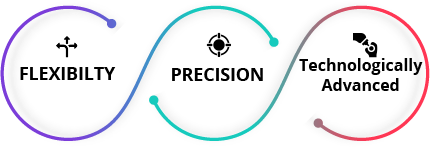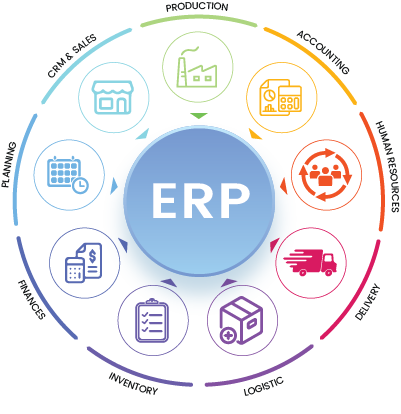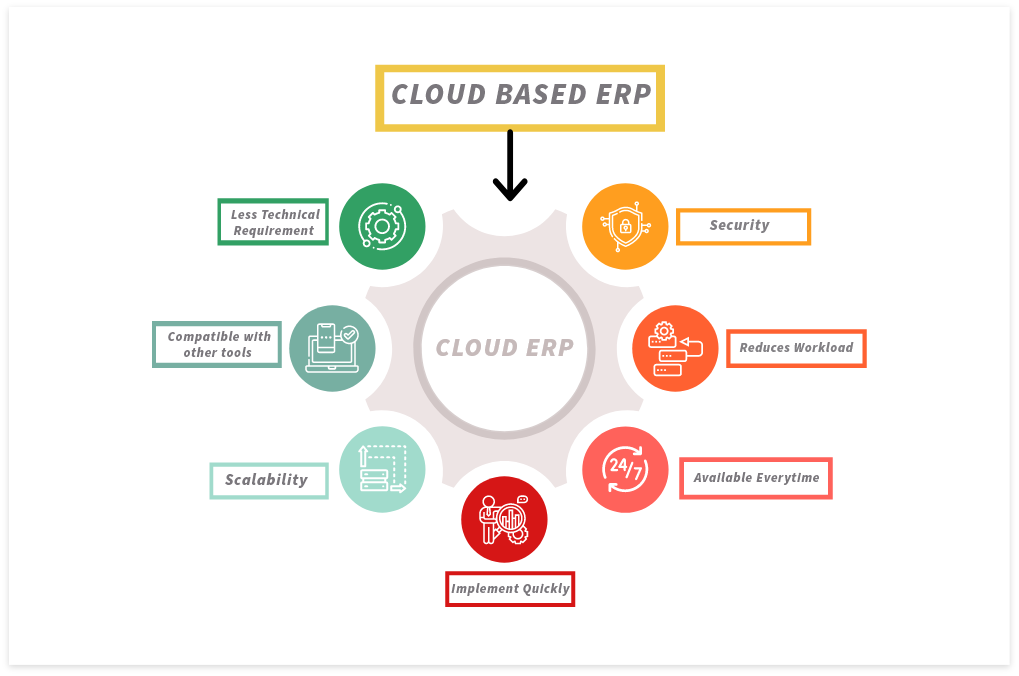Several small to medium-sized businesses want to use the right software that has all the functionality they need to help their business grow. Whether you are bustling between meetings or traveling abroad, you need immediate access to information about your company's operations and performance.
Therefore, if you are looking for one solution to manage all aspects of your business, you need to consider using cloud-based ERP (Enterprise Resource Planning) software.
With the help of a cloud-based ERP system, you can automate your business and reach your goals faster.
Do you want to know more about it? So, continue reading this blog to learn about it to help you grow your business:
What is a Cloud-Based ERP System?
The cloud-based ERP is a type of software that companies use to manage information across the organization. It does not run on the premises of the enterprise's own data center but the provider's cloud computing platform.
In the late 1990s, before the popularization of cloud computing, ERP systems ran inside the on-premises. In 1998, the cloud ERP area began, and the first ERP system was delivered over the internet, NetLedger, later renamed NetSuite.
The main purpose of using the cloud-based ERP is to:
- Access your business information from anywhere and on any device.
- Increase organizational efficiency.
- Provide more security and prevent data loss.
Choosing the correct cloud-based ERP system can be challenging. However, you need to consider some factors in your mind that will help you select the right one. The main factors are:
- Flexibility
- Precision
- Technologically Advanced

Components of Cloud-Based ERP Software
It offers remarkable advantages to small and large businesses. It is designed to incorporate the business processes, such as:
- Inventory management
- Accounting
- HR (Human Resource)
- Order management
- Project management
- Management and purchasing
- Attendance management
- Compliance management
Businesses of all sizes are considered to use cloud ERP, which greatly helps them in terms of cost, speed, and reliability. In addition, 95% of businesses see improvements after using cloud-based ERP software.

Types of Cloud-Based ERP Software
There are different types of cloud-based ERP software, and each has its own purpose and impact on your business.
| Types |
Description |
| Public Cloud |
Numerous businesses and service providers who share cloud computing services own the public cloud.
Examples: Google Cloud, Oracle Cloud, Microsoft Azure, etc.
|
| Private Cloud |
Not shared with any other organization. |
| Hybrid ERP |
It combines the private or public cloud. |
| Single-tenant SaaS |
One organization is served by a single infrastructure and ERP software version |
| Multi-tenant SaaS |
Multiple organizations can use a single version of the infrastructure and ERP software. The data of one organization is not accessible to those of another even though they all use the same software and are hosted on the same servers. A multi-tenant SaaS is often a genuine cloud ERP system. |
Cloud-Based ERP Advantages
In today's world, cloud-based ERP has become an essential part of the business. Cloud-based ERP is preferred all over the world due to its awesome flexibility, cost, and powerful innovation. Unsurprisingly, several successful business brands have built their business on the base of ERP.
Below are some main advantages that will help you choose the cloud-based ERP for your business.

Let’s discuss them in detail.
Security
Cloud ERP provides credible security to all-sized businesses. With cloud ERP, you do not need to worry about security issues like data getting hacked by a third party since the system encrypts your data and tracks all activity. In addition, the team of security experts is constantly updating security practices and tools to offer superior security.
Reduces Workload
One of the greatest benefits of cloud-based ERP is to reduce the workload. In some companies, IT staff is overloaded, so cloud software helps reduce their workload and improve productivity.
Available Every time and Everywhere
The cloud-based ERP system can access at any time and from anywhere. You can easily work while traveling and from home, especially during hours when systems are normally down for maintenance. Your data remains undamaged and can be accessed through the cloud if your entire IT infrastructure is lost in a natural disaster or fire.
Implement Quickly
For cloud-based ERP, investment in new hardware and updated slow systems is not needed. Even system updates are implemented without any difficulty.
Scalability
Scaling has become a breeze with cloud ERP because the entire infrastructure can be changed to the right size for each stage of your business development. Cloud ERP enables new and smaller enterprises to avoid the scalability growing pains that have impeded many of today's professional businesses.
Compatible With Other Tools
Lack of compatibility with other systems is a common problem that is found in many ERP systems. However, cloud-based software uses standard tools to integrate with other techniques so that you can pass data from other systems into your ERP.
Less Technical Requirement
Another main benefit of cloud-based ERP is no additional expense for network hardware. It makes the whole process easier and more affordable for the companies.
Cloud-Based ERP Vs. On-Premises
The below table shows the differences between cloud-based ERP and on-premises for your better understanding.
| Cloud-Based ERP |
|
Cloud-Based On-Premises |
| Low upfront cost |
Cost |
High upfront cost |
| Data security is the vendor’s responsibility |
Security |
Data security is the user’s responsibility |
| Implementation time is less |
Implementation |
Implementation time is more |
| Doesn’t offer much customization |
Customization |
Provide customization options |
| Hosted on vendor’s servers |
Deployment |
Installed locally on the company computer |
| Little IT involvement |
IT Involvement |
IT resource dependent |
Cloud-Based ERP Implementation
When you decide to deploy cloud-based ERP at your business, you should keep the implementation strategies in mind. These are:
Building a Business Case
First, you must create a business case when you deploy cloud ERP. Create a report focusing on the benefits, challenges, cost savings, and plans to overcome challenges.
Keep Your Team Informed
Keep everyone informed in your company, such as IT staff, partners, and other employees about what is changing, why, and when.
Identify Champions
Champions are those who believe in you and back your plan to invest in cloud ERP. They can assist you in developing the proper culture you seek to establish.
Set Your Team
To guarantee that everyone on your team is ready for success when it comes to using your new cloud ERP systems, invest in early planning, documentation, and training. Keep in touch with everyone and make sure to follow up with anyone whose question you are unable to resolve right away.
Ask For Help
Get help when you need it at any step. Therefore, hire a professional consultant.
Conclusion
Cloud-based ERP is one of the best holistic solutions to help your business grow. It is a proven and mature solution used by thousands of companies worldwide. Companies that choose cloud-based ERP can fast-track their transformation efforts.
Further, it will help you improve accessibility, boost efficiency, and drive business growth.
Frequently Asked Questions
Yes, Hisabat Online is a cloud-based ERP, and it is devoted to creating easy-to-use cloud ERP applications.
Below are some advantages that show why ERP software must be web-based rather than desktop-based applications.
- Easy deployment
- Easy access from the terminal
The architecture of cloud and web apps differs significantly. To operate, a web application or web-based program has to be connected to the internet constantly. On the other hand, a cloud application or cloud-based program handles processing on a local workstation or computer.



 Let’s discuss them in detail.
Let’s discuss them in detail.
